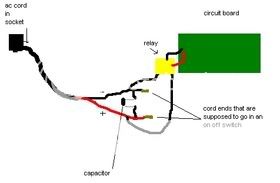antispatula
Active member
I don't know anything about electronics. Bare with me.
So I'm trying to fix a guitar amp. It was only a fuse, but before figuring that out, I broke the on off switch and a capacitor that ran between the ac cords, hot and cold. So to complete the circuit and turn the amp on, all I have to do is connect the hot and cold wires? Thats what a switch does if I'm not crazy. So the cap that was between the two wires broke off, I got a new cap that was at 2.2 uf, while the old one said to get a replacement that had between .0043 and 2.2 uf, so I was kind of at the max. I solder on the new cap, and then I plug in the power, and it's on, because the cap was completing the circuit, unlike the old one. Does anyone get what I'm saying? Then I somehow got the old cap to solder back on, and it didn't automatically turn it on, like it should be. Sorry if this makes no sense. This MAY help....

So I'm trying to fix a guitar amp. It was only a fuse, but before figuring that out, I broke the on off switch and a capacitor that ran between the ac cords, hot and cold. So to complete the circuit and turn the amp on, all I have to do is connect the hot and cold wires? Thats what a switch does if I'm not crazy. So the cap that was between the two wires broke off, I got a new cap that was at 2.2 uf, while the old one said to get a replacement that had between .0043 and 2.2 uf, so I was kind of at the max. I solder on the new cap, and then I plug in the power, and it's on, because the cap was completing the circuit, unlike the old one. Does anyone get what I'm saying? Then I somehow got the old cap to solder back on, and it didn't automatically turn it on, like it should be. Sorry if this makes no sense. This MAY help....





 If there are several big power supply caps, discharge each one separately, although they are likely wired in parallel so the first one you discharge might discharge all the rest. Don't assume that though.
If there are several big power supply caps, discharge each one separately, although they are likely wired in parallel so the first one you discharge might discharge all the rest. Don't assume that though. )
)